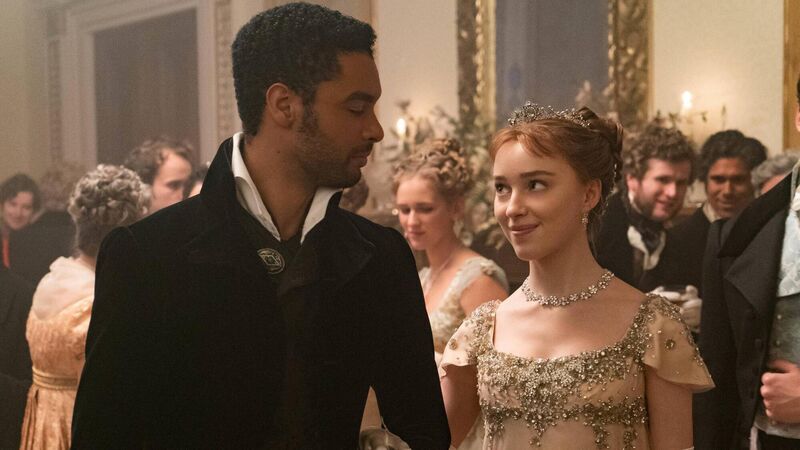Secret Irish Teacher: Students should be guaranteed 'objective' sex education

Rege-Jean Page as Simon Basset, Phoebe Dynevor as Daphne Bridgerton.
I was tested for Covid-19 last week. Many of you will know the HSE drill by now. I received instructions via a text message, having contacted my GP. It all felt very cold and clinical until I arrived at the centre. The moment our car made that left-hand turn into the testing area, I started to cry — full-on, snivelly snot crying. Not what anyone wants to see in a viral pandemic.
But on a crisp morning, below a luminous January sky, everything seemed beautiful and heroic there. Those people’s efforts to make me feel comfortable and calm made them appear like family, indisputably on my side. They made me think of and appreciate healthcare workers everywhere. As I know we all do.
We were tested inside a cavernous warehouse with open ends. Along cement walls hung fairy lights stuck up with tape and on the other side was a giant cardboard Christmas tree. A young man in army fatigues added to the feeling that I’d fallen down a crack between a sci-fi novel and a World War II film.
Different bays, white tables with testing kits, tended to cars in one of three queues. I tried to make eye contact with a woman opposite me, but she turned her head away.
Signs warned us against using our cameras. We had driven behind the drawn curtain of the pandemic, closed for comfort and privacy.
I cried all the way home too. I knew I would test positive. I think something about having Covid-19 gave me the licence to let it all (my feelings, my exhaustion) hang out. I’ve been feeling better since. Unwell, yes, but generally relieved.
Luckily, I’d stayed away from vulnerable people in my family this Christmas and thankfully hadn’t seen anyone since I contracted it.
I’m hoping by the time you read this, our government will have decided to delay a return to school or will allow only children of frontline workers to attend to regain some control. I’m not going to think about that for now.
What I am going to do is recover in bed along with my also Covid-afflicted husband and continue watching — taking breaks to keep our three children alive, obviously.
The Netflix series is adapted from a book, so it’s fully acceptable English teacher homework. It takes me down a quite different cinematic crack to my sci-fi testing experience, nestled somewhere between and .
It’s counter-factual, exploring the lives of London’s polite society in the 19th century, but through an unexpected, fantastical lens. Sumptuous fabrics, flowing champagne and beautiful people — the perfect escape for a winter afternoon (or fourteen of them).
I know for certain that my own return to school is delayed but, when we do get back, I’d love to ask students if they’ve watched it. It’s intended for audiences over 17 so I’ll have to tread carefully, testing the waters with my appropriately aged students. But the reasons I want to discuss it are significant.
is compelling for two reasons. Firstly, it does something interesting with race and, secondly, as a teacher of young adults, it highlights very modern concerns about consent.
In this new world, black and white people are on an equal footing. Viewers are informed that some royal once fell in love with a black woman, changing race relations forever.
Questions of consent, for both men and women, enter nearly every plotline in the show. Many viewers might see the show as unnecessarily raunchy, but I love its frank depiction of sex as something enjoyable, for both men and women. Equally, I appreciate its depiction of sex as something complicated, heavy with consequence.
I’m keen not to reveal too much here, but the main character marries without knowing what sex is. She has no clue how a baby is made. This puts her in a highly vulnerable position and creates conflict and despair in her life and in her marriage.
The show emphasises the necessity of knowing how our bodies work and how our desires need to be understood to be managed. In this regard, the show is historically accurate: only men, married women and the lower classes know what sex is; young ladies cannot be tarnished by such bawdiness before marriage.
It upsets me that schools in Ireland preserve these Victorian attitudes towards sex — and our government supports them, hiding behind the word ‘ethos’. Really, it’s just laziness and a lack of backbone.
Such schools are just like Daphne’s mother in the show, wishing to avoid awkward conversations. How can anyone accept that, in 2021, Irish students are not guaranteed objective sex education?
The bill to change this, to guarantee such education, was first presented in 2018. It’s presently at stage three of 11 stages. Time is warping for me here, on day five of self-isolation. But that bill appears to be moving very slowly. Doesn’t it? Is it moving backwards?
I hope every parent watches over lockdown and figures out the importance of young people knowing some basics about sex and consent. This patient is certainly losing patience.





